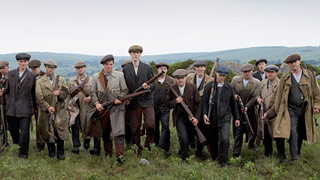Several years ago, I remember watching within the same week Bloody Sunday (Paul Greengrass, 2002), Rabbit-Proof Fence (Philip Noyce, 2002) and A Dry White Season (Euzhan Palcy, 1989). Needless to say, the English weren't my favorite people that week, all three films exposing various examples of English colonilization (exploitation) on three seperate continents. Like Sunday, The Wind that Shakes the Barley deals with the violent relationship between Ireland and England, only this time going back further through time at the dawn of the (limited) Free Irish State-establishing Anglo-Irish Treaty of 1922, the provisions of which divided the country and led to the Irish Civil War. Barley is the story of two brothers (Cillian Murphy and Padraic Delaney) hungry for freedom, the treaty satisfying one's hunger while increasing the other's, pitting the once-united siblings against one another.
Making complex events clear and accessible to the layman, Barley's beauty is matched only by its brutality, the classic green hills of Ireland often seen tainted with blood. In replaying the early events of Irish independence, the film attempts to solve the timeless feudal conundrum involving the possibility of achieving victory without turning into the enemy yourself.

It's a good film, but what I found most interesting about it is that it rewrites the Irish Revolution and Civil War as a Third World guerrilla insurgency. The historical analysis may be very questionable (not in terms of the Brits, who were every bit as evil as shown), but the parallels between then and now are worth paying attention to. As Paul Laverty, who wrote the script, has said: "If the British people knew what was done in their name in Ireland, maybe they wouldn't have been so eager to go into Iraq."
ReplyDelete